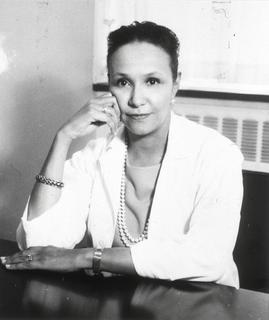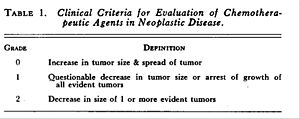Jane C. Wright facts for kids
Quick facts for kids
Jane C. Wright
|
|
|---|---|
 |
|
| Born | November 20, 1919 |
| Died | February 19, 2013 (aged 93) |
| Nationality | American |
| Education | Smith College New York Medical College |
| Known for | Development of chemotherapies; Co-founder of the American Society of Clinical Oncology |
| Scientific career | |
| Fields | Oncology |
| Institutions | Harlem Hospital Cancer Research Center New York University New York Medical College |
Jane Cooke Wright (November 20, 1919 – February 19, 2013) was a very important doctor and scientist. She was known for her work in cancer research and as a surgeon. Dr. Wright made big contributions to chemotherapy, which is using medicine to treat cancer.
She is famous for creating a new way to test cancer medicines. Instead of using lab mice, she used human tissue culture (human cells grown in a lab). She also helped lead the way in using a medicine called methotrexate to treat breast cancer and skin cancer.
Early life and education
Jane Wright was born in Manhattan, New York City. Her mother, Corinne Cooke, was a teacher. Her father, Louis T. Wright, was a doctor and a pioneer himself. He was one of the first African American graduates from Harvard Medical School.
Jane came from a family of doctors. Her grandfather, Dr. Ceah Ketcham Wright, was born into slavery and later earned his medical degree. Her step-grandfather, Dr. William F. Penn, was the first African American to graduate from Yale Medical College. Her uncle, Harold Dadford West, was also a doctor. Jane and her sister, Barbara Wright Pierce, followed in their family's footsteps. They became doctors even though it was hard for women and African Americans at that time.
Jane went to the Ethical Culture Fieldston School, where she was very active. She was the art editor for the yearbook and captain of the swim team. She loved math and science.
After high school, Jane received a scholarship to Smith College. She first wanted to study art, but her father encouraged her to study medicine. At Smith, she swam on the varsity team and learned German. She graduated in 1942.
Then, she got another scholarship to New York Medical College. Because of World War II, she had to finish her medical degree in just three years. She graduated with honors in 1945. After that, she did an internship at Bellevue Hospital. In 1947, she married David D. Jones, Jr., who was a lawyer. She finished her surgical training at Harlem Hospital in 1948.
Professional career
After medical school, Dr. Wright worked at Bellevue Hospital and Harlem Hospital. In 1949, she joined her father at the Cancer Research Foundation at Harlem Hospital. Her father had started this center.
Jane and her father were very interested in chemotherapy. In the 1940s, chemotherapy was a new idea. It was often seen as a "last resort" treatment, and doctors weren't sure about the right medicines or doses. Jane and her father wanted to make chemotherapy better and more available to everyone.
They were among the first to use certain medicines like nitrogen mustard agents and folic acid antagonists to treat cancer. Folic acid antagonists stop cancer cells from growing by blocking a substance they need to make new DNA. Since cancer cells grow very fast, stopping them from making DNA is important.
One of their most important discoveries was about a medicine called methotrexate. They found it was very effective against many types of cancer, including leukemia, Hodgkin's disease, and breast cancer. Methotrexate is still a main chemotherapy drug used today. Their work helped make chemotherapy a proven and effective way to fight cancer, saving many lives.
Dr. Wright and her team developed a special way to test cancer drugs. They would take a small piece of a patient's tumor and grow it in a lab (tissue culture). Then, they would test different medicines on these lab-grown tumors. They found that the medicines that worked well on the lab tumors also worked well for the patients. This helped them choose the best treatments.
Dr. Wright also found ways to use different chemotherapy drugs together. She studied how to change the order and amount of drugs to make them work better and have fewer side effects. She found successful treatments for breast and skin cancer. Her work helped skin cancer patients live up to ten years longer.
She also developed a non-surgical way to deliver strong medicines to tumors deep inside the body, like in the liver or spleen. She published over 100 papers about cancer chemotherapy. She also worked with another famous African American woman scientist, Jewel Plummer Cobb.
Dr. Wright was also a leader in the medical field. In 1964, she was the only woman among seven doctors who started the American Society of Clinical Oncology. In 1971, she became the first woman president of the New York Cancer Society. In 1967, she became an associate dean at New York Medical College. This made her one of the highest-ranking African American doctors at a major medical college at that time.
She also advised the US government on cancer research. She traveled around the world, leading groups of cancer doctors to countries like China, the Soviet Union, and countries in Africa. She treated cancer patients in Ghana in 1957 and Kenya in 1961.
Dr. Wright retired in 1985. She was given an honorary Doctor of Medical Sciences degree from the Women's Medical College of Pennsylvania. She once said, "There's lots of fun in exploring the unknown. There's no greater thrill than in having an experiment turn out in such a way that you make a positive contribution."
Personal life
Jane Wright was a very determined person. When the Rubik's Cube came out in 1980, she bought one and learned how to solve it. She loved puzzles, and she saw treating cancer as a big puzzle to solve.
She lived in a time when men mostly worked in medicine, but she didn't let that stop her. She was eager to make a difference in cancer treatment. She was also an African American woman during a time of black pride, and she used this to help her succeed. She was known for being modest and kind to her patients. She was also very motivated and brave. If another doctor wasn't looking into all possible treatments for a patient, Dr. Wright would, even if it wasn't her patient.
On July 27, 1947, Jane married David D. Jones. They had two daughters, Jane Wright Jones and Alison Jones. Her husband was a lawyer who started groups to help young African Americans. Sadly, he passed away in 1976. Both of their daughters also went into the medical field. One became a psychiatrist, and the other became a clinical psychologist. This shows how her family continued its medical legacy.
Besides science, Jane loved art and swimming. Before she studied medicine, she was an art major. In 1952, she received an award and said, "My plans for the future are to continue seeking a cure for cancer, to be a good mother to my children, and a good wife to my husband."
After she retired in 1987, she enjoyed sailing, watercolor painting, and reading mystery books. Jane Wright passed away on February 19, 2013, in Guttenberg, New Jersey, at 93 years old. Her two daughters and her sister survived her.
Awards
- "Merit Award" from Mademoiselle Magazine (1952)
- Damon Runyon Award (1955)
- Elected to membership in Sigma Xi (1962)
- "Spirit of Achievement Award", from Albert Einstein College of Medicine (1965)
- Links (1965)
- Honorary Doctor of Medical Sciences degree by the Women's Medical College of Pennsylvania (1965)
- Hadassah Myrtle Wreath Award (1967)
- Smith Medal from Smith College (1968)
- American Association for Cancer Research Award (1975)
- Otelia Cromwell Award from Smith College (1981)
- "Jane C. Wright, MD, Young Investigator Award" was created in 2011 by the American Society of Clinical Oncology.
- The "Minorities in Cancer Research Jane Cooke Wright Lectureship" is given by the American Association for Cancer Research to a scientist who has made great contributions to cancer research and helped other minority scientists.
- She was mentioned in a 2014 episode of Rizzoli and Isles.
See also
 In Spanish: Jane Cooke Wright para niños List of African-American inventors and scientists
In Spanish: Jane Cooke Wright para niños List of African-American inventors and scientists
 | George Robert Carruthers |
 | Patricia Bath |
 | Jan Ernst Matzeliger |
 | Alexander Miles |


